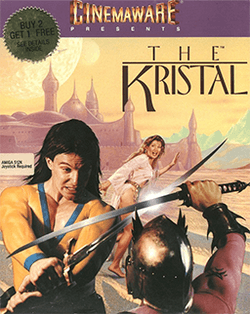The Kristal
| The Kristal | |
|---|---|
 Cover art | |
| Developer(s) | Fissionchip Software |
| Publisher(s) |
Addictive Games Cinemaware |
| Designer(s) | Rodney Wyatt, Michael Sutin |
| Artist(s) | Michael Haigh, David A. Hardy, Chris Petts, Rodney Wyatt, Julian Edkins |
| Composer(s) | Rodney Wyatt, Mickey Keen |
| Platform(s) | Amiga, Atari ST, MS-DOS |
| Release |
|
| Genre(s) | Adventure game |
| Mode(s) | Single-player |
The Kristal is an action game/adventure game first released in 1989 for the Commodore Amiga computer. It was later released for the Atari ST and MS-DOS. It was developed by the UK-based company Fissionchip Software, and published in Europe by Addictive Games and in the USA by Cinemaware. Unusually for a video game, the game is based on a play, The Kristal of Konos, written in 1976; the authors of the play worked together with the game developers and the play was never shown in theatres or on film before the game's release. A dialog introducing the setting recorded by Patrick Moore, who introduced both the game and play.
The player takes the role of a pirate named Dancis Frake, on a mission to recover the "Kristal" on behalf of the Kring of Meltoca.
The game features a number of different classic game genres merged: fighting, space flight/combat, and (to a limited extent) LucasArts-style point-and-click adventuring.
Reception
The game was reviewed in 1989 in Dragon #152 by Hartley, Patricia, and Kirk Lesser in "The Role of Computers" column. The reviewers gave the game 4 1⁄2 out of 5 stars.[1] Computer Gaming World gave the game a very negative review, citing the poor controls for the action sequences and the repetitive interrogation of other characters. The review summed up the game saying, "The Kristal is virtually unplayable except to the master arcade gamers that might have the time and patience for the "challenge"."[2]
References
- ↑ Lesser, Hartley; Lesser, Patricia; Lesser, Kirk (December 1989). "The Role of Computers". Dragon (152): 64–70.
- ↑ Wagner, Roy (October 1989), "The Kristal", Computer Gaming World, pp. 56–57